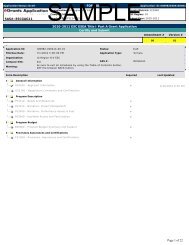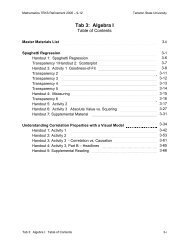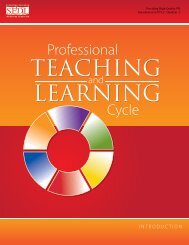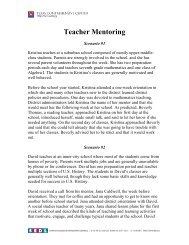The Professional Teaching and Learning Cycle: Introduction - Texas ...
The Professional Teaching and Learning Cycle: Introduction - Texas ...
The Professional Teaching and Learning Cycle: Introduction - Texas ...
You also want an ePaper? Increase the reach of your titles
YUMPU automatically turns print PDFs into web optimized ePapers that Google loves.
<strong>Professional</strong> <strong>Teaching</strong> <strong>and</strong> <strong>Learning</strong> <strong>Cycle</strong><br />
culTure<br />
SEDL<br />
An instructional content specialist has an important responsibility to build the capacity <strong>and</strong><br />
expertise of teachers in the target content area. A person (or persons) needs to be designated<br />
formally to help teachers throughout each step of PTLC. <strong>The</strong> person(s) enlisted for this role<br />
could be a literacy or mathematics coach, a departmental chair, or a curriculum specialist at<br />
the district level.<br />
As noted previously, teachers may lack the requisite content knowledge to plan effective<br />
lessons aligned to state st<strong>and</strong>ards. <strong>The</strong> content specialist is critical to building this content<br />
knowledge. This individual needs to have the time, expertise, <strong>and</strong> credibility among the staff<br />
as an instructional leader to help guide teams of teachers as they implement this process. <strong>The</strong><br />
content specialist coordinates team efforts with the school leaders as he or she helps teachers<br />
<strong>and</strong> supports improvements in instruction. This assistance should be viewed as necessary<br />
support to help build the capacity of teachers. Teachers should be assured that they are not<br />
being “evaluated” by the content specialist. If an administrator serves in this role, care must be<br />
taken so that teachers feel supported, not pressured.<br />
It may be helpful for an external facilitator to serve as an additional support for teachers<br />
<strong>and</strong> leaders as they adopt <strong>and</strong> integrate PTLC into their system. During the first few years of<br />
implementation, teachers usually need considerable support from an external facilitator—one<br />
who not only guides teachers during this process, but also provides support <strong>and</strong> guidance for<br />
leaders as they implement <strong>and</strong> monitor this process.<br />
<strong>The</strong> culture of the school <strong>and</strong> district in which PTLC is being implemented is crucial.<br />
“Improving school requires the creation of collaborative cultures. Without the collaborative<br />
skills <strong>and</strong> relationships, it is not possible to learn <strong>and</strong> to continue to learn as much as you need<br />
to know to improve.” (Fullan & Hargreaves, 1991)<br />
Throughout the PTLC process, relationships between teachers <strong>and</strong> leaders, <strong>and</strong> among teachers<br />
themselves, are established <strong>and</strong> strengthened. Leaders work to build an environment of trust<br />
<strong>and</strong> a structure conducive to collaboration, where each participant has a voice <strong>and</strong> a sense of<br />
mutual responsibility <strong>and</strong> accountability.<br />
<strong>The</strong> frequent monitoring <strong>and</strong> appraisal of this environment throughout the work will help to<br />
ensure that, once created, the collaborative culture endures.












